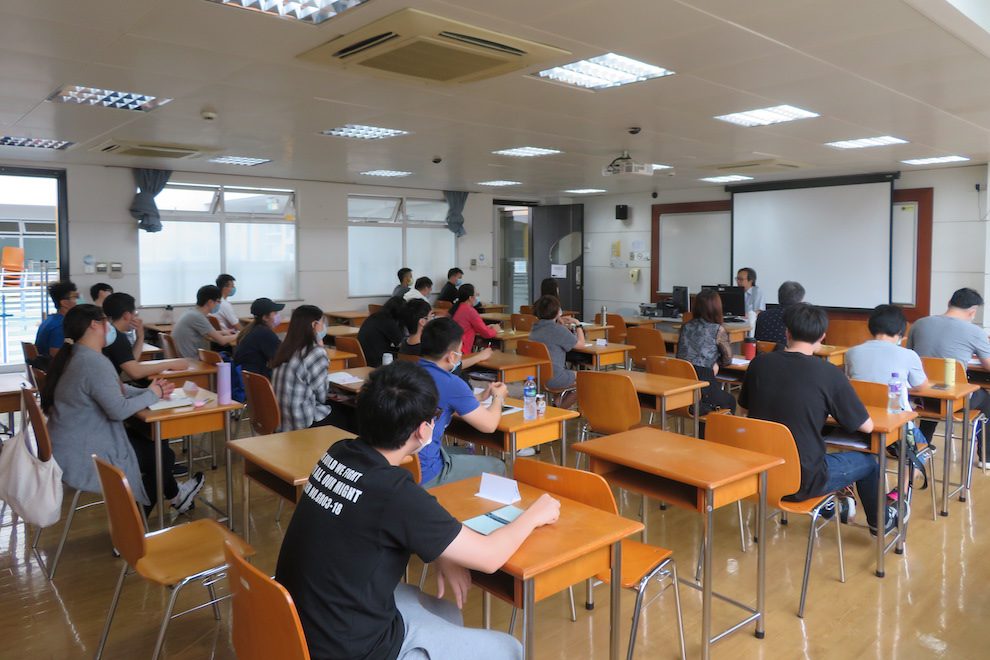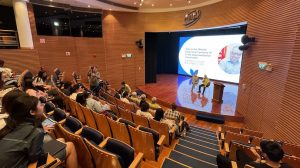A new series of vocational courses that cover skills useful in the hospitality business has been introduced by IFTM. The courses are part of a scheme by the Macao SAR Government to improve vocational training of Macao workers, so they are better prepared to find jobs while the Covid-19 pandemic lasts.
The Labour Affairs Bureau introduced the vocational training scheme in March. The scheme offers 2,000 places in dozens of courses, covering skills useful in hospitality, retail, food and beverage, construction, and building maintenance. On completion of a course, each trainee is eligible for a grant of up to MOP6,656.
For the second phase of the 3-phase scheme, IFTM is providing 3 courses, namely in hotel front desk operations, in hotel security and in hotel room services. Each course has places for 50 trainees, divided into 2 classes of 25 people, says Mr. Kurma Mac. Mr. Mac is the Coordinator for Macao Occupational Skills Recognition System and Hospitality Courses in the IFTM School of Continuing Education.
He says some subjects were intended to broaden a trainee’s understanding of the industry the person is training for, and have elements that are common to all 3 courses. The common elements introduce the trainees to the tourism, hospitality and events industries.
Mr. Mac says: “As tourism, events and hospitality are closely connected industries, the introductory subjects can help trainees have a more comprehensive understanding of the sector.”
Every trainee will also be taught skills in communication, customer service and interview techniques. Mr. Mac says these soft skills “can be useful” to trainees in their professional lives, helping them engage with others.
From the classroom to the workplace
The vocational training courses offered by the Labour Affairs Bureau are designed for unemployed residents of Macao, and for hospitality workers that have had their incomes affected by the Covid-19 pandemic. That includes workers in tourism – such as tour guides, taxi drivers and coach drivers – and workers in the meetings and exhibitions industry.
The bureau is also endeavouring to match trainees to job vacancies, in a strategy to help people move swiftly from the classroom to the workplace. To help make that happen, the operators of integrated resorts in Macao have made available 2,600 positions for cleaners, waiters, receptionists, security guards, chefs and maintenance workers.
In the first phase of the scheme, the Labour Affairs Bureau offered 340 places in 17 courses, covering skills useful in the construction and building maintenance industries. In April, the bureau began taking applications for the 860 places in the courses offered in the second phase, which cover skills useful in the food and beverage, hotel, construction, and building maintenance industries.
Each IFTM course consists of 104 hours of full-time instruction over 13 days. The classes have been adapted to meet social distancing guidelines and other precautions to ensure public health precautions against Covid-19.
Mr. Mac says the trainees have a variety of experiences and do not share a common career path. “We cannot expect that a taxi driver can immediately become a seasoned professional in the hospitality sector after a 104-hour course,” he says. But the courses can be a first step to support that ambition, exposing participants to “new concepts” that can be “useful for their future”, Mr. Mac explains.
Help in tough times
Among the trainees taking the course in hotel security, there are high hopes of finding new jobs. Mr. Fong and Mr. Leong are unemployed taxi drivers taking it. Both have been out of work since February, when precautions to limit the spread of the pandemic drastically cut the number of visitors to Macao, their main source of fares.
“There was a high risk in continuing to drive a taxi,” says Mr. Leong. “You can be infected with Covid-19 and, in the end, I didn’t have enough passengers to cover the daily operating expenses.”
Both men are middle-aged. Before enrolling in the course, neither had an interest in working as a hotel security guard, but they are now considering doing so. “We are no longer young,” says Mr. Fong. “We need to feed our families.”
Another trainee in the Institute’s security guard training course is former hospitality industry worker Ms. Chao. “I resigned from my last job in November and I planned to return to the labour market in April. But in late January, the whole situation changed,” she says, referring to the pandemic’s effect on the economy.
Ms. Chao says she would not immediately look for work as a security guard after finishing the IFTM course, but she expects her new skills will be “really helpful” in her career. “I was working in hotels. With this course, I can have a chance to learn more about one part of hotel operations. I believe it will broaden my career path,” she says.
Mr. Kenneth Kung, an Instructor at IFTM’s School of Continuing Education, is among the trainers delivering the course. Mr. Kung has more than 20 years’ experience in hospitality, including in hotel security. He says the IFTM course offers a comprehensive overview of hotel security, covering front desk operations, surveillance and the management of loading and unloading areas.
“All these are closely connected,” Mr. Kung says. “It is an all-round course. Trainees will learn many concepts related to hotel operations.”









